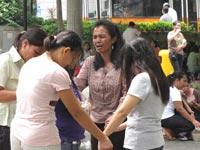Plight of Filipino caregivers raised at Geneva conference

Filipinos in Canada and around the world held colorful celebrations to mark the 113th Philippine Independence Day last weekend as its leaders promised to look after the welfare of Filipino overseas migrant workers and reduce poverty.
Philippine Labour and Employment Secretary Rosalinda Baldoz assured overseas Filipino Workers (OFWs) worldwide of the commitment of the Aquino administration in providing them with the necessary protection of their rights and welfare.
Representatives of overseas migrant workers in Canada hoped that Manila will stay true to its words but expressed skepticism.
“While the Philippine government props them up as “modern-day heroes”, it fails to look after welfare and safeguard their rights as workers and Philippine nationals… It even reneges on its duty to attend to the proper repatriation of the remains of overseas Filipino workers who have died in their host countries, some under mysterious or still unresolved cases,” said Migrante Canada.
Baldoz’s assurance came by way of her 113th Philippine Independence Day (PID) message to the estimated eight to 11 million OFWs around the globe, e-mailed to media on the eve of the celebrations.
Written in the national language Filipino and anchored on this year’s PID theme “Kalayaan, Paninindigan ng Bayan” (“Freedom, the Nation’s Conviction), the message also highlighted OFs’ heroism-their innate talent and abilities as well as their perseverance in staying abroad-which has kept their country’s Third World economy afloat, thereby making them on equal footing with the heroes of the past who dedicated their lives to gain freedom from foreign domination.
“It is for this reason that on this day, I would like to emphasize that the government of President Benigno Simeon C. Aquino III is certain and serious about furthering your and your families’ rights and welfare,” said Baldoz.
There are between eight and 11 million OFs, including the undocumented and those who have gained permanent residence.
As of 2010, the top 10 destinations of OFs abroad, according to the Commission on Filipinos Overseas, are the United States, 3,177,947; Saudi Arabia, 1,159,003; Canada, 639,686; United Arab Emirates, 609,704; Australia, 336,140; Qatar, 263,980; Malaysia, 243,877; Japan, 210,617; United Kingdom, 200,987; and Hong Kong, 163,090.
According to the Bangko Sentral ng Pilipinas (Central Bank of the Philippines), OFWs’ remittances in 2010 was at $18.76 billion, up by 8.2 per cent from the previous year.
In his Independence Day massage, President Aquino said that his administration “has planted the seeds of reform.”
Painting a rosy picture for all Filipinos, the President said “in the name of the Philippines, I declare the opening of a new chapter in our history, where each Filipino can reap the fruits of his labor, where laws are imposed on rich and poor alike, where everyone can chart his own destiny, where one can have freedom with honor. This is the free Philippines. We are the free Filipinos.”
As Philippine Day was being celebrated, Migrante Canada, which looks after the interests of migrant workers in Canada were at the International Labour Organization 100th Session in Geneva making representations on the fourth item of the conference agenda: “Decent work for domestic workers.”
In a statement, Migrante Canada said, more than 80 percent of caregivers in Canada come from the Philippines. They come here through the Live-in Caregiver Program (LCP), a federal program that recruits caregivers from other countries.
“Most of them have left their home country due to massive unemployment and poverty to look for job and a better life abroad that their government cannot provide to them.
Like all domestic workers, caregivers are also in a very vulnerable and precarious situation. They work for long hours and suffer abuse in various ways. Physical and psychological violence is very common.
The absence of a national daycare program and the continuing privatization of public services will further bolster the demand for migrant workers including domestic workers.”
Migrante Canada called on the Canadian government and other governments to adopt the Convention and Recommendation on Domestic Work at the International Labour Conference.
“It is time to end the modern-day slavery endured by domestic workers in Canada and around the world.”






